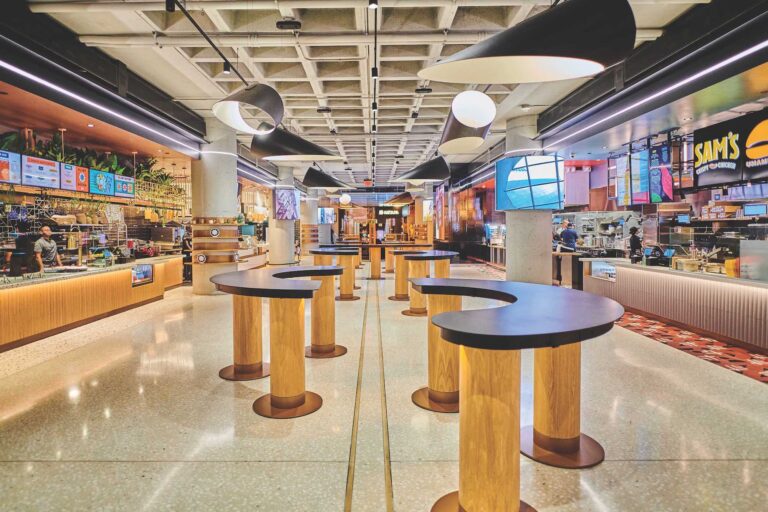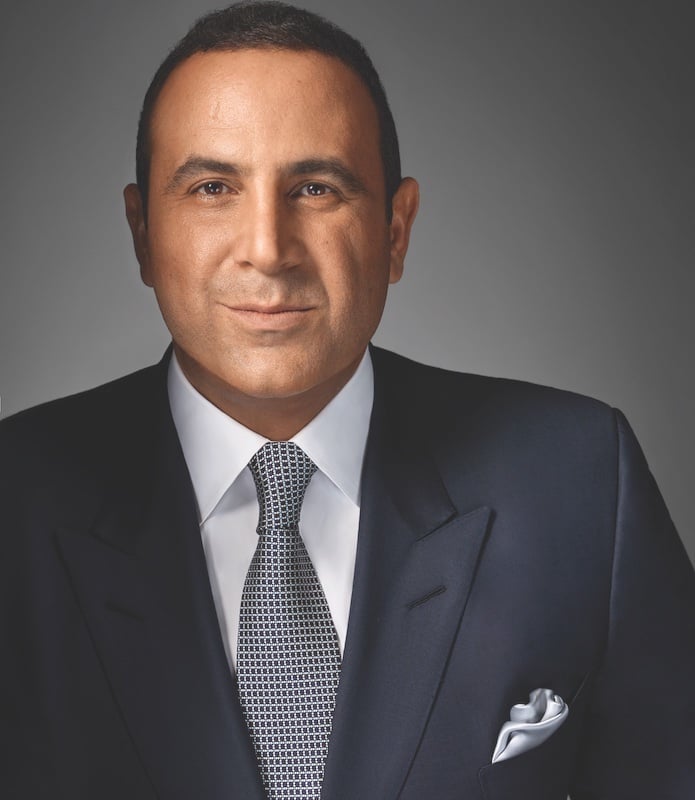
If you’ve enjoyed a night out or gone to a bar in Los Angeles, chances are that you’ve encountered one of Sam Nazarian’s local establishments. Nazarian, a hospitality industry veteran, is continuing to grow his portfolio as he prepares to open several new restaurants and nightclubs and expands the ghost kitchen branch of his hospitality company, SBE Entertainment Group.
Nazarian was once a more prominent figure in L.A.’s hospitality industry, managing a hefty portfolio of nightclubs, hotels, bars and restaurants through SBE, which he founded. His name has hit newsstands less frequently over the last few years, with his most recent headline coming from the listing of his Bel-Air home for a reported $39.5 million in mid-2022 when Nazarian moved to Miami.
While now a Miami resident, Nazarian is keeping his presence, and financial stake, alive in the city. Back in 2020, the mogul sold his remaining 50% stake in SBE’s hotel platform for a reported $850 million to focus on Creating Culinary Communities, better known as C3. C3 acquires food brands, and licenses them out to the commercial restaurants with physical kitchen space. Current licensed brands include Krispy Rice sushi, Cindy Lou’s Cookies and Kumi, a Japanese street-food company.
The brand’s food is integrated into the participating restaurant’s back-of-house operations, in similar fashion to a ghost-kitchen setup, and preparation is done by the restaurant’s own employees. After this, the brands’ items are made available through UberEats, Postmates, Door Dash and C3’s Go by Citizens app.
Using unused kitchens
Part of C3’s pitch is that, for many large restaurants, prep kitchens are underutilized during operating hours, and that many companies want to expand their food offerings to hit more customer demographics. It said that one of its major partnerships is with TGI Fridays, a deal that launched in September of 2021. Ray Blanchette, chief executive of TGIF, said in a video to C3’s investors that the company had helped TGIF make its kitchens more productive and profitable without “cannibalizing” its current business. TGIF is preparing and selling several of C3’s brands out of its kitchens, including Krispy Rice and Kumi.
“What we focus on is finding big restaurant companies that need new content,” Nazarian said. “For us, it was really unlocking the value of existing infrastructure … (rather than) turning kitchens into ghost kitchens, or opening locations for delivery only.”
With SBE, Nazarian is opening three new ventures in Los Angeles in 2024: Casa Dani with chef Dani Garcia, which will join an existing location in New York, a Century City eatery to its Katsuya chain, which has three other L.A. locations, and a nightclub called Zouk LA. Other local SBE properties that are already open for business include S Bar Brentwood and Hyde Sunset Kitchen & Cocktails.

Of his ventures, Nazarian is openly the most excited about C3, which itself is based in Miami. Although owned by SBE, he said that C3 is a stand-alone company with its own investor pool and board. C3, whose portfolio has expended during the past few years, makes money by licensing the brands it creates or acquires. It currently owns about 40 brands and recently purchased Miami-based online ordering management company Nextbite, which was founded by restaurant industry innovator Alex Canter. C3 is active in 4,000 kitchens, and the company has a goal of being in 50,000 kitchens by 2030.
“With the reputation that I’ve built in the last 20 years, growth definitely comes in spurts,” Nazarian said. “(C3) is going to accelerate here very fast, because companies are now coming to us for solutions and we’re one of the only companies that really bet on the right side of the idea, which is the (brand licensing) side … we’re excited about where we sit, but we think that the opportunity set is massive.”
Digital kitchens, which involve a food service or brand being provided exclusively via delivery or pick-up, and which don’t have brick-and-mortar stores or a dine-in service component, aren’t a new business model. However, Salar Sheik, founder of Savory Hospitality Restaurant Consulting, said that with SBE’s resources and Nazarian’s name being attached, clients could possibly make more money with C3 than its competitors.
“There are other companies doing what he’s doing, but it’s different when it comes to someone that’s already branded and has a background in hospitality standards,” Sheik said. “His company, SBE, has been really good at branding and marketing and that’s where operators tend to go stale and fail, a lot of times. So, I think that’s a big push for these operators to bring someone on board to help them generate revenue on their off hours.”
Social media-savvy
Part of C3’s model involves extensive social media marketing to promote the food brands, including collaborations with social media content creators. It also has partnered with content creator management company Loaded and food media content platform Tastemade Inc., both of which are based in Santa Monica. Many of C3’s brands are sponsored or owned by celebrities, including competitive eater and YouTube star Matt Stonie’s Stonie Bowls and brands from professional chefs like Masaharu Morimoto and Dario Cecchini.
“TGIF and (other restaurant chains) already have marketing people, but they’re probably just not as up to date as what (Nazarian) has,” Sheik said. “I’ve seen this work very well for the operator, because they’re unable to keep up with the times and to leverage the marketing aspect and deliver aspects of it.”
In addition to delivery and pick-up options, C3 operates “digital food halls” called Citizens in Manhattan and Atlanta, the latter of which opened this year. It said that it will soon be opening Citizens locations in Seattle, Miami and California. Akin to a cafeteria, the company said that they serve as a marketplace for its brands and offer a physical brick-and-mortar location from which customers can order food from a variety of its brands for pick-up or delivery. At the halls, customers can interact with kiosks representing the brands and order food from multiple companies in a single order.
“It’s a great way for us to test the product as well,” Nazarian said. “When we create (or acquire) a brand, we’ll test it for months and months to see how it works: supply chain, all aspects of ingredients, kitchen equipment, training, things like that. So, food halls actually provide a very big service to us, and in general are also a very good business, so it’s a win-win.”
Sheik said that there is some risk involved with a brand putting its food into a ghost kitchen where it is prepared by outside chefs, since quality control could be an issue. Still, he said that, with SBE’s resources, it’s almost a no-brainer for a restaurant chain to give C3’s ghost kitchen offer a try.
“It’s kind of like, ‘why wouldn’t I do that?’” Sheik said. “SBE have a good track record of producing hospitality for the most part. Yeah, there’s been few hits here and there, but in the hospitality world, they’re a success. Sam Nazarian is a success, so for someone like him to say, ‘I can make you an extra this and that,’ it’s worth the risk.”
